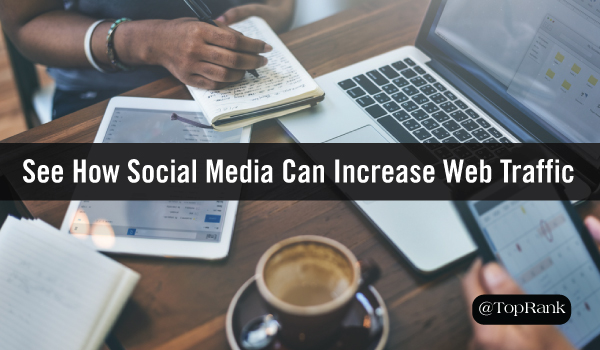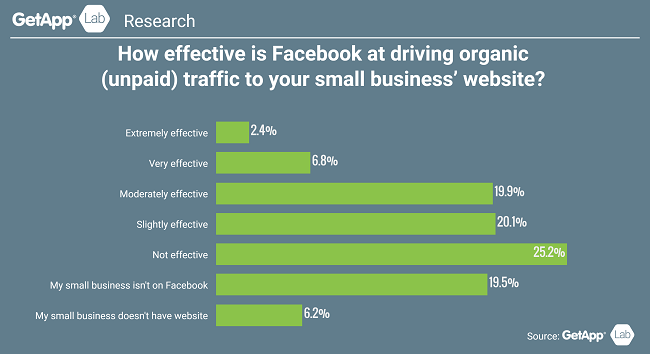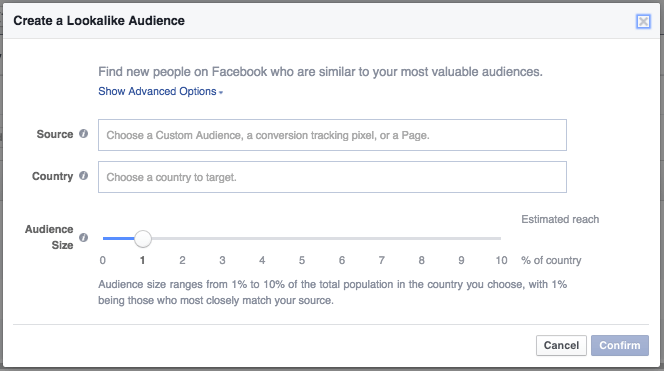
For the past decade, many small business marketers have taken an “If you build it, they will come” approach to Facebook. They share engaging content, encourage conversation, and optimize their Facebook page to meet their goals. Unfortunately, too often the expected outcome doesn’t quite match the reality:

Facebook has an average of 1.71 billion active users a month—that’s an audience worth addressing. Yet business owners struggle to convert Facebook users into organic traffic to their websites.
Business app discovery platform GetApp recently surveyed 500 owners of small and medium-sized businesses. Less than 30% of respondents reported that Facebook was moderately to extremely effective at driving organic traffic to their sites. By contrast, 20.1% rated it slightly effective, and over 25% said it was not effective at all.

If you’re a small business owner and Facebook is the focus of your marketing efforts, it may be time to branch out. Here are a few ways to use a little strategy and a small budget to increase traffic to your website.
#1: Make Sure Your Shares Encourage Website Traffic
Some businesses do a great job creating a fun, relatable feed. They have memes. They use emoji in a cool, not cringe-worthy way. They even share valuable content from around the web.
All of that is great for building your audience on Facebook. But it’s not enough to build a hip Facebook page, put your URL in the sidebar, and watch the clicks roll in. Make sure to regularly share content hosted on your website, with an eye-catching visual and a summary that compels a click.
If you’re already doing that, keep reading for more tips. But if you haven’t been explicitly, actively, repeatedly encouraging your Facebook audience to visit your site, this is an easy win.
#2: Use a Little Strategic Paid Promotion
“Stellar work, Nite,” I hear you say. “So the way to generate more organic traffic is to pay for traffic?”
Hear me out, though. Organic traffic is free(ish), and that’s great. It’s wonderful when people opt to look at your content. But what’s better is traffic from a more relevant audience of your choosing. Facebook makes it easy to get results with a really small budget.
Take your top-performing organic content—the post that already has likes and shares, so you know people like it—and put $5 behind it. Target it to a specific audience that is valuable to you. Most importantly, use the “Create a Lookalike Audience” option to reach a new audience.

Keep a close eye on your $5 investment and use what you learn to optimize the next round. The small investment is worth it, if it pays off in more relevant traffic. As you attract a new audience, you can start to pull them from Facebook to your own site.
#3: Turn Facebook Followers into Subscribers
As Content Marketing Institute Founder Joe Pulizzi puts it, “Don’t build your house on rented land.” As long as your audience is exclusively on Facebook (or any other social media platform), the platform determines how and when you can reach them. If Facebook has a choice between allowing you organic reach or demanding a ransom—well, you can guess which way they’ll go.
So when you share links to your site’s content on Facebook, make sure there are prominent opportunities to subscribe. Whether it’s to your blog feed or a weekly newsletter, give your audience the option to opt in.
You can also add a Subscribe button to your Facebook Page. When you’re logged in as the page, you will see the “Add a Button” option right under your header image. Choose the “Sign Up” button and link it to a subscription landing page.

Make sure the page has a quick but compelling statement of benefit and very little else—just a quick form to fill out and a big shiny Subscribe button.
#4: Look to LinkedIn*
If your business is B2B, Facebook is likely not the best fit for a primary marketing focus. LinkedIn tends to be a better place for B2B business to build an audience and generate leads—according to research, 80% of B2B leads are sourced through the platform.
LinkedIn isn’t exclusively for B2B, however. You can create a Company Page and build an audience for your B2C company as well. You can also use long-form posts on LinkedIn to promote your personal thought leadership. Use the platform to build credibility and visibility that can transfer to your business. Great content leads to more profile views, and you can construct your profile to lead visitors to your business’ website.
Do You Believe in Life after Facebook?
Facebook can still be a good place to build an audience and boost your business’ brand awareness. But don’t rely on likes and follows to do any heavy lifting. Make sure what you share on your feed is strategically created to encourage action. Don’t be afraid to invest $5-10 every few weeks on targeted promotion, or to try other social media platforms better suited to your company’s offerings. Finally, the end goal should be to amass an audience on your own site, not someone else’s platform.
*Disclosure: LinkedIn is a TopRank Marketing Client.


